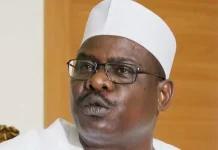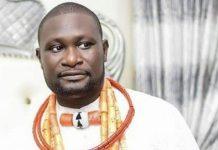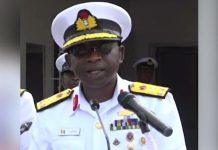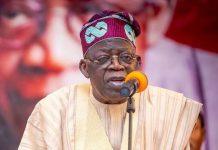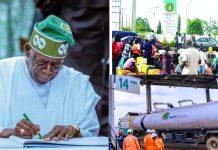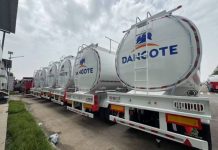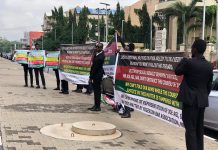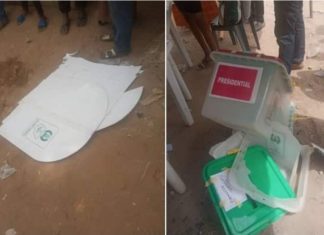

The Economic Community of West African States (ECOWAS) says it requires about 5.2 billion dollars to address infrastructure deficit and achieve its core objectives of driving the subregion’s economic growth.
The ECOWAS Commissioner for Infrastructure, Energy and Digitalization, Mr Sediko Douka, made this known while addressing a news conference in Abuja on Thursday.
He said that in order to curb these challenges, the subregion’s leaders had earlier approved the creation of an ECOWAS fund for the development and financing of the transport and energy sectors (FODETE).
Douka explained that the fund was dedicated to financing regional infrastructure, particularly in the transport and energy sectors, and financed by taxing member states’ main export resources like agriculture, oil and gas, natural minerals.

He described FODETE as a viable funding mechanism, which was expected to generate more than 350 million dollars annually, and would continue to grow over a projected 20-year period.
The Commissioner said that to address the numerous infrastructure challenges in West Africa, ECOWAS had implemented various regional electricity and energy programs and projects towards subregional economic integration and growth.
He said: “to address these challenges, ECOWAS set up specialized agencies in the field of energy, namely, the West African Power Pool (WAPP) in Cotonou, Benin.
“Others are the Regional Electricity Regulatory Authority (ERERA) in Accra, Ghana, the Centre for Renewable Energy and Energy Efficiency (ECREEE) in Praia, Cape Verde, and the West African Gas Pipeline Authority (WAGPA) in Abuja, Nigeria.
“The strategic objective of the WAPP is to integrate the operation of the Community’s national electricity grids into a unified regional electricity market, with a view to providing the citizens of ECOWAS Member States with a stable, regular, and reliable supply of electricity at a competitive cost in the medium and long term.”
According to him, to achieve this objective, WAPP promotes and develops electricity production and transmission facilities and equipment, and coordinates electricity trading among ECOWAS member states.
The Commissioner said that the WAPP investment program derived from the ECOWAS Master Plan for regional electricity production and transmission facilities, the current one being the 2019-2033 plan.
He said that ECOWAS also embarked on a Regional Electricity Access Project (ECOREAP) and Battery Energy Storage System (BEST) aimed at enhancing member states’ efforts in the field of electricity supply.
The project, he said, was to facilitate the connection to the electrical grid for 1.1 million households in nearly 600 localities, and financed by the World Bank with 225 million dollars, targeting 1,075 villages in Gambia, Guinea Bissau and Mali.
He said that ECOWAS also embarked on Regional Electricity Access Project (ECOREAP) and Battery Energy Storage System (BEST), aimed at enhancing member states’ efforts in the field of electricity supply.
“The project aims to increase electricity access for West African populations. It seeks to facilitate the connection to the electrical grid for 1.1 million households in nearly 600 localities.
“Financed by the World Bank with USD 225 million, the project covers Gambia, Guinea Bissau, and Mali, targeting 1,075 villages.
“The objectives of the project are to increase electricity access in Niger, Senegal and Mauritania and improve the capacity of the electricity system to ensure synchronous operation in the ECOWAS power system through energy storage equipment installation in Côte d’Ivoire, Niger, and Mali,” he said.
Douka said that ECOWAS also embarked on a Regional Off-Grid Electricity Access Project (ROGEAP), which aimed to increase electricity access rates for households, commercial enterprises, and community institutions.
Financed by the World Bank with USD 338.7 million, he said it was being implemented in 19 countries, including the 15 ECOWAS member states, Chad, Cameroon, Mauritania, and the Central African Republic.
The Commissioner said that ECOWAS had also initiated regional electricity market in June 2018, with its implementation overseen by ERERA and WAPP.
He said that in the realm of renewable energies, several projects were underway with the objective of increasing energy capacity and access to electricity, particularly for rural populations.
“To date, 14 out of the 15 member states are interconnected. In fact, all 14 mainland countries of ECOWAS are interconnected.
“Only the 15th country, Cabo Verde, remains unconnected, which will soon be rectified through the implementation of a high-voltage submarine cable, with feasibility studies due to start shortly.
“Consequently, starting from 2024, electricity exchanges (both purchases and sales) will be possible, making tariffs more competitive and ensuring coverage of demand, which currently stands at only 60%.
“What’s interesting here is that all you need is enough independent energy producers to cover demand,” Douka added.(NAN)
By Mark Longyen
Join Television Nigerian Whatsapp Now
Join Television Nigerian Facebook Now
Join Television Nigerian Twitter Now
Join Television Nigerian YouTUbe Now

